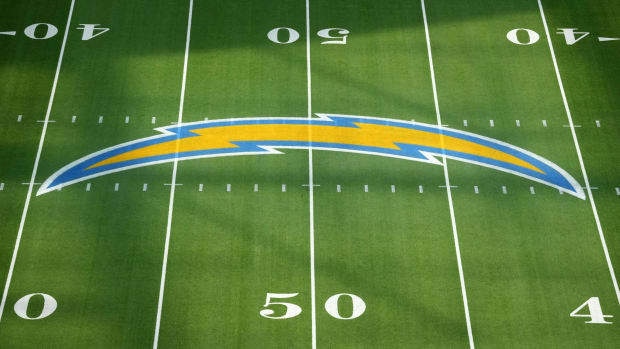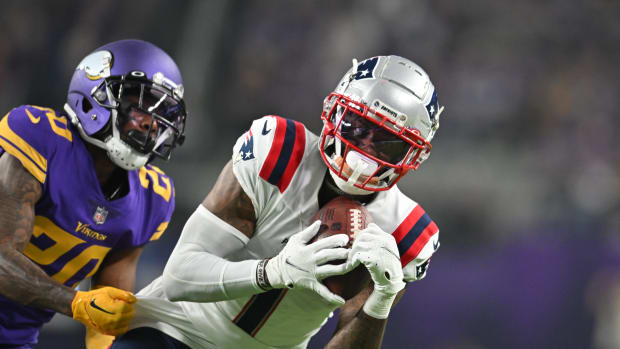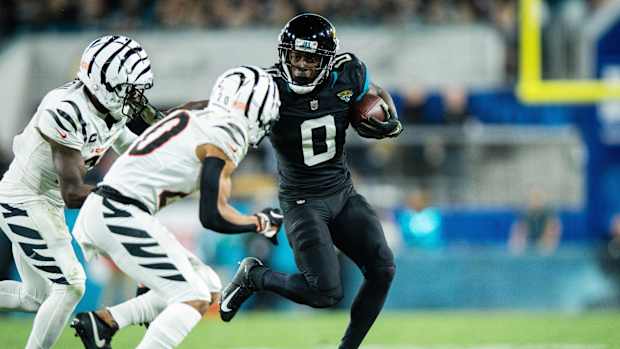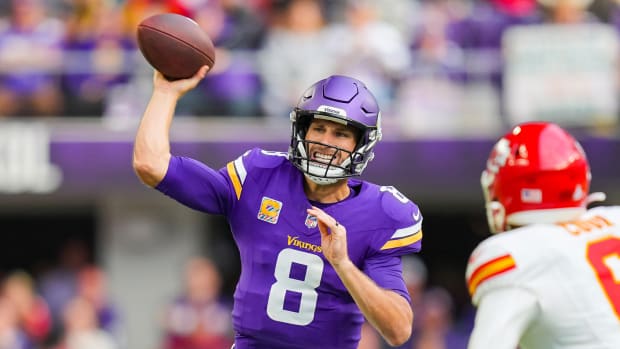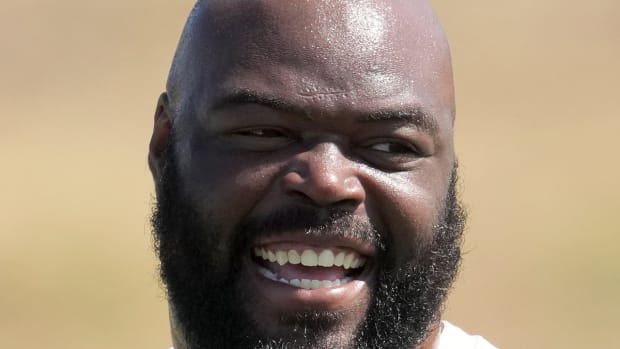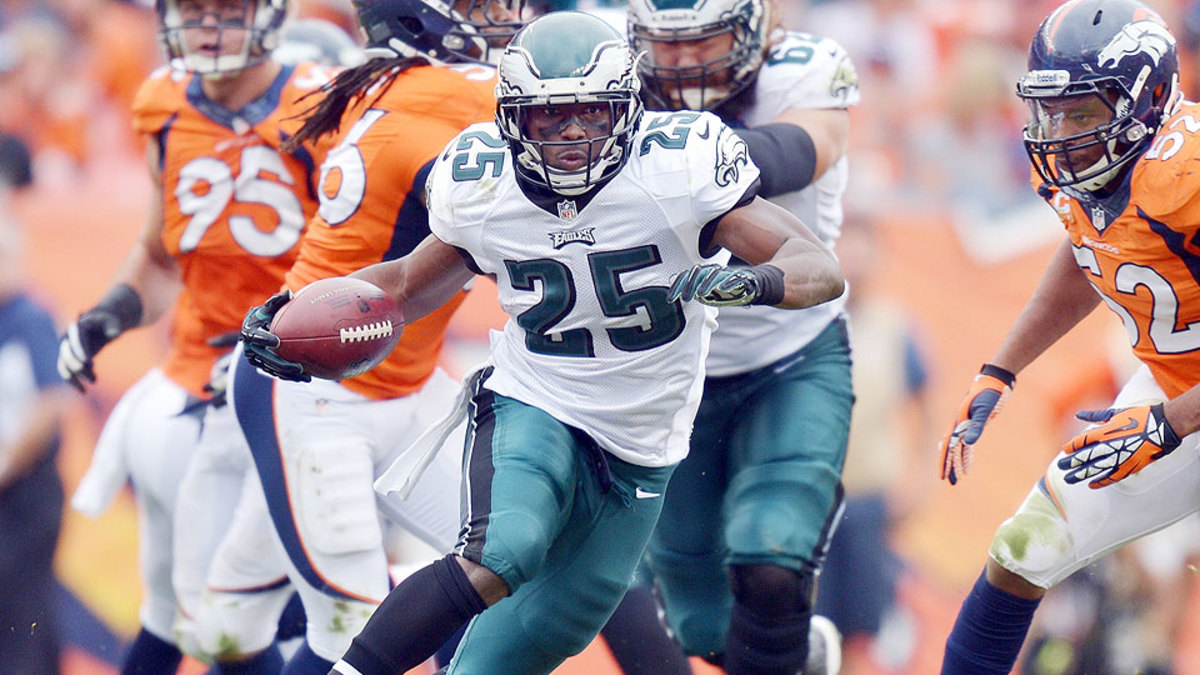
Offseason Report Card: Eagles
In another offseason ... like, you know, last offseason ... the Eagles' move to swap out Michael Vick for Mark Sanchez would have been the storyline of the summer. Vick, one of the NFL's most electrifying and controversial players, left for the Jets in free agency, ceding his roster spot to Sanchez, once a No. 5 overall pick on the verge of busting out as a pro.
Those transactions did turn their share of heads, especially after the two quarterbacks switched teams, leaving Vick to compete against Geno Smith for the starting job in New York. But with the Eagles fresh off an NFC East title and welcoming in plenty of new faces as they prepare for a highly anticipated second year under a forward-thinking coaching staff, the move was overshadowed by the rest of what has been an eventful 2014 offseason in Philadelphia.
This is Nick Foles' offense, and it is Chip Kelly's team. The latter point was proven emphatically when Philadelphia cut wide receiver DeSean Jackson for what Kelly described as "football reasons" on the same day NJ.com published a report claiming that Jackson's rumored "gang connections" were "troubling to the Eagles".
Only running back LeSean McCoy was more productive than Jackson in last year's offense, so the Eagles will be banking on Jeremy Maclin to regain his explosiveness following an ACL injury and on rookie Jordan Matthews to play an integral role early. Foles also has a new safety net in jitterbug back Darren Sproles, who was acquired in a trade with New Orleans. Sproles' style has Chip Kelly Offensive Star written all over it.
On defense, the Eagles added draft picks Marcus Smith, Taylor Allen and Beau Hart to their front seven, but the real facelift came in the secondary. That's where another ex-Saint, Malcolm Jenkins, will be given the reins at a problematic safety position. He will be joined by rookie safety Ed Reynolds, rookie cornerback Jaylen Watkins and veteran Nolan Carroll. Watkins and Carroll may be forced to duke it out with each other for playing time behind Bradley Fletcher, Cary Williams and Brandon Boykin.
Grade: B-
Best acquisition: Malcolm Jenkins, S
Well, Jenkins was the most important acquisition, at least. The Eagles' safety position has been an Achilles' heel for years -- last season's group of Nate Allen, Earl Wolff and Pat Chung was rather abysmal and still arguably played better as a unit than Allen and Kurt Coleman did in 2012.
Is Jenkins a true upgrade? Maybe, though he arguably was one of New Orleans' worst defenders over the past season-plus, hence the Saints' aggressive move in free agency for Jairus Byrd to pair with 2013 draft pick Kenny Vaccaro. In the defense he leaves behind, Jenkins was an obvious deficiency; in Philadelphia, his presence could represent a step forward.
"I think he's an extremely intelligent football player and that obviously showed just from the first day we got a chance to get on the field," Kelly said of Jenkins during OTAs, per the Eagles' website. "He's played multiple positions before in this league. So he understands the stress on the corners and what that is. I think sometimes for a safety, you can explain that to them. He's actually played it and understands it really well.
"When you've watched [Jenkins] out there, it feels like he's been in the system for a while."
Kelly might find that veteran presence worth any holes Jenkins has displayed in his game. Allen has done little to guarantee himself a starting spot, while Wolff failed to progress as the Eagles hoped he would in his rookie campaign. The other options at safety include 2014 fifth-rounder Ed Reynolds and special-teams extraordinaire Chris Maragos, formerly of the Seahawks. With 63 starts under his belt (57 since 2010), the 26-year-old Jenkins is the old hand within a young and inconsistent position group.
The Eagles' up-tempo offense drops a lot of pressure on the other side of the ball, as evidenced by the 670 passing attempts fired at Philadelphia's secondary last season, more than any other team in the league. In lockstep with that stat, the Eagles finished dead last in yards allowed through the air.
Jenkins is far from a great cover safety, but he can run the show in an area of the field where Philadelphia desperately needs a little guidance.
Biggest loss: DeSean Jackson, WR
Again, it's all relative. On the surface, losing a player of Jackson's caliber -- coming off 82 catches for 1,332 yards and nine touchdowns, all career highs, last season -- appears to be a strike against the Eagles made worse by Jackson landing with division rival Washington.
In reality, this may be addition by subtraction for Philadelphia's receiving corps, which looks far deeper in 2014 than it did in '13. Jeremy Maclin's return from injury is one of the obvious sources of that line of thinking, although the real key to success may lie in second-round draft pick Jordan Matthews. The Vanderbilt product was a Round 1 talent in the eyes of many (including yours truly). Being taken 42nd overall only gives Matthews more of an opportunity to stand out as a steal.
Matthews caught 94 passes in 2012 and then 112 last season for Vanderbilt, despite far from stellar quarterback play in any of his four years on campus. His presented an NFL-ready game to scouts, much the same way that Keenan Allen did a year earlier before starring for San Diego. Matthews also would have had a difficult time hand-picking an offense better suited to his game, one that relies on sharp routes and strength at the catch point as opposed to breakaway speed.
In Matthews and Josh Huff, Kelly added a pair of versatile weapons for his unique attack. Asking either to replace Jackson completely is setting the bar high, considering how much offense Jackson produced over his six-year career with the Eagles. But Kelly seemed to have minimal interest in keeping Jackson around, either because of Jackson's off-field issues or Kelly's desire to customize his receivers to his scheme. The Eagles may feel the pain of removing a de facto No. 1 receiver from their depth chart at first, but they could be more dangerous in the long run.
Underrated draft pick: Taylor Hart, DE, Oregon (fifth round, 141st overall pick)
Three veteran linebackers -- Trent Cole, DeMeco Ryans and Connor Barwin -- form the nucleus of Philadelphia's front seven, and they will be bolstered this year by incoming rookie Marcus Smith, a bit of a Round 1 reach who has the ability to contribute as a pass-rusher. Beyond those names, this team actually has an enviable young foundation up front: 2012 draft picks Mychal Kendricks, Vinny Curry and Fletcher Cox, 2011 undrafted free agent Cedric Thornton and 2013 third-round nose tackle Bennie Logan.
They now will drop the 6-foot-6, 280-pound Hart into the mix. One of Kelly's former players at Oregon, Hart will provide depth behind Cox and Thornton at the end positions in Philadelphia's 3-4 as a four-technique lineman. (Most times, you'll see 3-4 defensive ends in five-technique spots; not so for Kelly: "We call 'em a four-technique, the two-gap guys.") He can and will hold his own against the run, but Hart also racked up 16 sacks in college.
"[Hart is a] relentless football player, obviously what we're looking for at the defensive end spot," Kelly said after Hart's selection in the draft. "A million starts for us when we were at Oregon, continued to play at a high level once we left. Is a true 3-4 two-gapper, which is what we're looking for."
Hart should know exactly what Kelly wants out of him, given their time together at Oregon. Fifth-rounders are rarely guaranteed roster spots headed into camp, so Hart will have to lock down a permanent job in the coming weeks. But it would be a surprise if he did not stick.
Looming question for training camp: What adjustments will be made for year two of the Kelly regime?
This is a more open-ended, intangible inquiry than, say, "How many touches will Darren Sproles see each game?" or "Will Brandon Graham be on the Week 1 roster?" -- both pressing issues, mind you. For the most part, everything was pretty hunky-dory during Kelly's initial go-round. There was the latest Michael Vick injury, of course, but Nick Foles stepped in and threw for 27 touchdowns to just two interceptions while leading Philadelphia to a division title. The end result of a wild-card loss to New Orleans was a disappointment, but it did little to dampen the Eagles' 7-1 close to the season or their promise for 2014.
The new challenge is similar to what Washington faced headed into last season: repeating success when everyone expects it. Easy to forget given how '13 played out is that the Eagles were 3-5 at the halfway point, after back-to-back losses to Dallas and the Giants in which they scored a combined 10 points. The next week, they hung 49 on Oakland to spark that season-ending run to the division title.
Being the team to beat is a far different animal than being an upstart. More than mere raised expectations led to Washington's quick collapse from the playoffs in 2012 to a three-win squad last season, but the weight of the NFC East crown certainly played its part. How will Foles handle adversity? What will Kelly do if Maclin and Matthews struggle to fill Jackson's shoes? Is the defense capable of improving?
All those questions merely scratch the surface of what's to come.
































